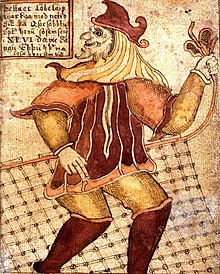
Back Loki Afrikaans Loki ALS لوكي Arabic لوكى ARZ ল’কি Assamese Loki Azerbaijani Loki BAR Локі Byelorussian Локи Bulgarian লোকি Bengali/Bangla

Loki is a god in Norse mythology. He is the son of Fárbauti (a jötunn) and Laufey (a goddess), and the brother of Helblindi and Býleistr. Loki is married to the goddess Sigyn and they have two sons, Narfi or Nari and Váli. By the jötunn Angrboða, Loki is the father of Hel, the wolf Fenrir and the world serpent Jörmungandr. In the form of a mare, Loki was impregnated by the stallion Svaðilfari and gave birth to the eight-legged horse Sleipnir.
Like other gods, Loki is a shape shifter and in separate sources appears in the form of a salmon, a mare, a fly, and possibly an elderly woman named Þökk (Old Norse 'thanks'). While sometimes friendly with the gods, Loki engineers the death of the beloved god Baldr. For this, Odin's specially engendered son Váli binds Loki with the entrails of one of his sons, where he writhes in pain. In the Prose Edda, this son, Nari or Narfi, is killed by another of Loki's sons, who is also called Váli. The goddess Skaði is responsible for placing a serpent above him while he is bound. The serpent drips venom from above him that Sigyn collects into a bowl; however, she must empty the bowl when it is full and the venom that drips in the meantime causes Loki to writhe in pain, thereby causing earthquakes.
Loki is foretold to eventually break free from his bonds and, among the forces of the jötnar, to go to battle with the gods, during which time his children play a key role in the destruction of all but two humans over the events of Ragnarök. Loki has a particular enmity with the god Heimdallr. The two are in fact prophesied to kill one another during Ragnarök.
Loki is attested in the Poetic Edda, compiled in the 13th century from earlier traditional sources: the Prose Edda and Heimskringla, written in the 13th century by Snorri Sturluson; the Norwegian Rune Poems, in the poetry of skalds, and in Scandinavian folklore. Loki may be depicted on the Snaptun Stone, the Kirkby Stephen Stone and the Gosforth Cross. Scholars have debated Loki's origins and role in Norse mythology, which some have described as that of a trickster god. Loki has been depicted in, or referenced in, a variety of media in modern popular culture.